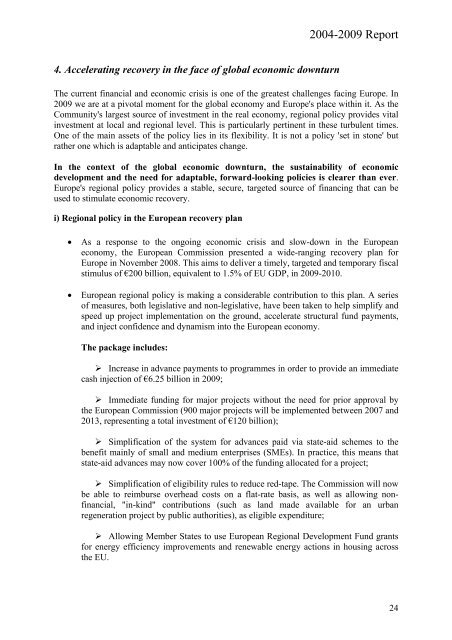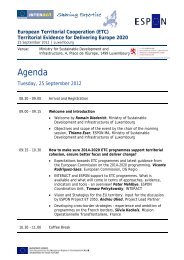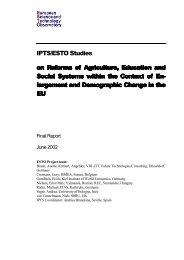Achievements of Europe's regional policy 2004-2009 - Et2050.eu
Achievements of Europe's regional policy 2004-2009 - Et2050.eu
Achievements of Europe's regional policy 2004-2009 - Et2050.eu
Create successful ePaper yourself
Turn your PDF publications into a flip-book with our unique Google optimized e-Paper software.
<strong>2004</strong>-<strong>2009</strong> Report<br />
4. Accelerating recovery in the face <strong>of</strong> global economic downturn<br />
The current financial and economic crisis is one <strong>of</strong> the greatest challenges facing Europe. In<br />
<strong>2009</strong> we are at a pivotal moment for the global economy and <strong>Europe's</strong> place within it. As the<br />
Community's largest source <strong>of</strong> investment in the real economy, <strong>regional</strong> <strong>policy</strong> provides vital<br />
investment at local and <strong>regional</strong> level. This is particularly pertinent in these turbulent times.<br />
One <strong>of</strong> the main assets <strong>of</strong> the <strong>policy</strong> lies in its flexibility. It is not a <strong>policy</strong> 'set in stone' but<br />
rather one which is adaptable and anticipates change.<br />
In the context <strong>of</strong> the global economic downturn, the sustainability <strong>of</strong> economic<br />
development and the need for adaptable, forward-looking policies is clearer than ever.<br />
<strong>Europe's</strong> <strong>regional</strong> <strong>policy</strong> provides a stable, secure, targeted source <strong>of</strong> financing that can be<br />
used to stimulate economic recovery.<br />
i) Regional <strong>policy</strong> in the European recovery plan<br />
• As a response to the ongoing economic crisis and slow-down in the European<br />
economy, the European Commission presented a wide-ranging recovery plan for<br />
Europe in November 2008. This aims to deliver a timely, targeted and temporary fiscal<br />
stimulus <strong>of</strong> €200 billion, equivalent to 1.5% <strong>of</strong> EU GDP, in <strong>2009</strong>-2010.<br />
• European <strong>regional</strong> <strong>policy</strong> is making a considerable contribution to this plan. A series<br />
<strong>of</strong> measures, both legislative and non-legislative, have been taken to help simplify and<br />
speed up project implementation on the ground, accelerate structural fund payments,<br />
and inject confidence and dynamism into the European economy.<br />
The package includes:<br />
‣ Increase in advance payments to programmes in order to provide an immediate<br />
cash injection <strong>of</strong> €6.25 billion in <strong>2009</strong>;<br />
‣ Immediate funding for major projects without the need for prior approval by<br />
the European Commission (900 major projects will be implemented between 2007 and<br />
2013, representing a total investment <strong>of</strong> €120 billion);<br />
‣ Simplification <strong>of</strong> the system for advances paid via state-aid schemes to the<br />
benefit mainly <strong>of</strong> small and medium enterprises (SMEs). In practice, this means that<br />
state-aid advances may now cover 100% <strong>of</strong> the funding allocated for a project;<br />
‣ Simplification <strong>of</strong> eligibility rules to reduce red-tape. The Commission will now<br />
be able to reimburse overhead costs on a flat-rate basis, as well as allowing nonfinancial,<br />
"in-kind" contributions (such as land made available for an urban<br />
regeneration project by public authorities), as eligible expenditure;<br />
‣ Allowing Member States to use European Regional Development Fund grants<br />
for energy efficiency improvements and renewable energy actions in housing across<br />
the EU.<br />
24







